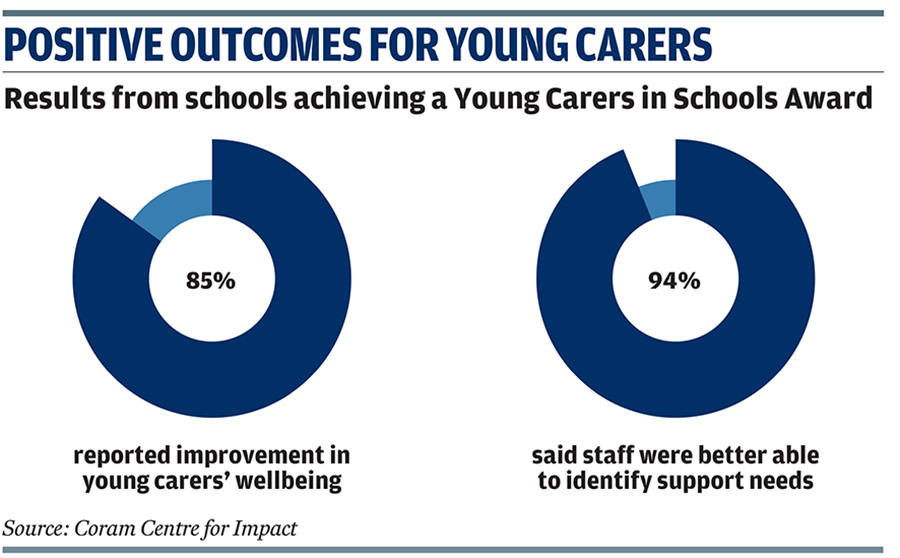How schools address needs of young carers
Charlotte Goddard
Tuesday, October 30, 2018
Young carers face challenges in fully accessing education, so schools are being given the tools to better identify those in need of support.

PROJECT
Young Carers in Schools Award
PURPOSE
To equip schools to support young carers and recognise good practice
FUNDING
The award scheme is part of the wider Young Carers in Schools programme, which was kickstarted by the Queen's Trust and the Big Lottery Fund. It is now funded by a range of businesses, charities and trusts.
BACKGROUND
Being a young carer can be associated with challenges such as educational difficulties and bullying. The Children's Society and the Carers Trust developed the Young Carers in Schools (YCiS) Award as a way of encouraging schools to support young carers.
ACTION
Schools are asked to complete a baseline review to help them reflect on current practice and identify steps that can be taken to improve identification and support of young carers. The YCiS Award consists of five standards designed to ensure there are assigned members of staff with responsibility for understanding and addressing young carers' needs and awareness is raised throughout the school. The standards also require young carers to be identified, listened to, supported within the school and signposted to other services.
At bronze level, the focus is on developing support within school while silver sees schools begin to take a more multi-agency approach. A school at gold level will be taking a whole-family approach, ensuring young carers and their families have the support they need to reduce levels of inappropriate caring and allow the young person to fully access education and leisure activities. Each level has a number of criteria which must be met, such as running and promoting drop-in sessions.
Schools have access to tools to help them develop their provision to meet the criteria, such as an online step-by-step guide, a range of 30-minute webinars, an interactive map showing local services, and an e-newsletter listing training events and new resources.
The Carers Trust is working with local partners to design and roll out Parent and Young Carer Ambassador programmes in five areas, to promote the award. "Working with young carers services, we will recruit and train parents and young carers to be YCiS ambassadors," says Anna Morris, England policy and development lead at the trust. Training could cover confidence-building sessions to speak to school staff, running assemblies to highlight young carers' experiences or setting up peer support groups for young carers. The programme will include a "train-the-trainer" element.
"Our programme shows identification and support of young carers in schools is important, and it works," says Giles Meyer, chief executive of the Carers Trust. "In one case the number of young carers a school identified rose from two to 54. The main way young carers can come forward is through schools. A teacher might be the first professional a young carer feels they can approach and trust."

OUTCOME
Currently 211 schools have achieved a Young Carers in Schools Award. The Coram Centre for Impact was funded by The Queen's Trust to evaluate the programme, and published its findings in September this year. Almost three quarters - 73 per cent - of schools taking part in the programme thought young carers were now more engaged in the classroom, while 72 per cent thought they were more motivated to learn and 63 per cent said achievement had improved. In all, 63 per cent of schools said young carers were now less likely to have high absence rates, and 54 per cent said they were more likely to attend all lessons. Most schools - 85 per cent - said young carers' wellbeing had improved, 83 per cent felt they were happier and 78 per cent thought they had better mental health.
The evaluation found 68 per cent of schools said they had identified more than half of their young carers as a result of the programme. On average participating schools identified 59 per cent of their young carers. In 94 per cent of schools staff said they now had a better understanding of the types of support young carers may need while 92 per cent reported staff were better able to spot the signs a pupil was a young carer.
If you think your project is worthy of inclusion, email supporting data to derren.hayes@markallengroup.com




